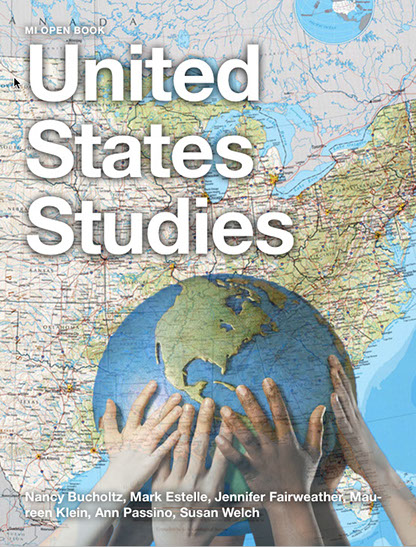

To download the books please visit us on a desktop or tablet.
From the Michigan Content Expectations:
Using the context of the United States, fourth grade students learn significant social studies concepts within an increasingly complex social environment. They examine fundamental concepts in geography, civics and government, and economics through the lens of Michigan history and the United States. Expectations that particularly lend themselves to being taught through a historic, geographic, civic, or economic lens are denoted.
Geography
Students draw upon their knowledge of spatial awareness, regions, human systems, and human-environment interactions to create more sophisticated understandings of these concepts within the context of the United States. By focusing on the work of geographers, students explore the types of questions geographers ask and the tools they use to answer these questions. Students learn that maps can be used to describe elevation and climate, as well as to analyze patterns of population density. In preparation for the study of American history, students concentrate on the geography of the United States. Students expand their knowledge of human systems using case studies and stories to understand push and pull factors of migration and the influence of migration on culture within the United States. Students deepen their understanding of human environment interactions by assessing positive and negative effects of human activities on the physical environment of the United States. The firm understanding of United States geography established in fourth grade prepares students for the study of American history in fifth grade and world geography in grades six and seven.
Civics and Government
Fourth grade students learn how the United States government works. Students examine the purposes of government as set forth in the Preamble to the U.S. Constitution, how our current form of government functions to serve those purposes, and the probable consequences of not having government, rules, or laws. Building upon their understanding of the structure and functions of government in Michigan, students use examples to explore how the powers of the federal government are limited. Students also begin to understand that the federal and state governments have different powers as a foundation for learning about federalism in fifth grade. Concepts of governmental taxing and spending are expanded from previous grades as students apply these concepts to the federal government. Students explore how key concepts such as popular sovereignty, rule of law, checks and balances, separation of powers, and individual rights serve to limit the power of government and how these ideas are manifested in the Constitution and Bill of Rights. Students learn how government affects their daily lives by identifying examples of rights guaranteed by the Constitution and Bill of Rights. Students explain why all rights have limits, describe the relationship between rights and responsibilities, and investigate ways people can work together to promote the values and principles of American democracy.
Economics
Fourth grade students continue to deepen their understanding of economic principles with a focus on the characteristics of market economies. They move beyond applying the economic concepts of scarcity, choice, and opportunity costs in personal economic decisions and begin to think like an economist, identifying the types of questions economists ask. Economic decision making is examined by applying the concepts of price, competition, and incentives. Students develop an understanding of specialization, division of labor, competition, and interdependence and explore their effects on productivity. Moreover, the circular flow model is introduced in fourth grade, providing a foundation for future studies in economics. Students build upon their knowledge of governmental taxing and spending as they explore why certain public goods are not privately owned. Students also take an increasingly sophisticated look at the global economy as the expectations explore the impact of global competition on the national economy.
Public Discourse, Decision Making, and Citizen Involvement
Students deepen their understanding of public issues and the importance of citizen action in a democratic republic. Using the
context of the United States, fourth grade students identify public policy issues facing citizens in the United States, use graphic data and other sources to analyze information about the issue, and evaluate alternative resolutions. By utilizing examples, students expand their understanding of how conflicts among core democratic values often lead people to want different resolutions to a public policy question. Students demonstrate competency in expressing their own opinions relative to a public issue in the United States and justify their opinions with a reasoned argument with increasing complexity. This foundational knowledge is built upon throughout the grades as students use their knowledge of how, when, and where to communicate and become more proficient in communicating positions on sophisticated public issues with a reasoned argument.
Overview of the MI Open Book Project United States Studies
The 4th grade United States Studies book will consist of four major units with sub chapters and sections within each focused on the four main disciplines, and public policy.
Geography of the United States
- What is the relationship between humans and the environment in the US?
- What tools do geographers use to understand the five themes of geography?
- How were the Native people in different US regions able to survive using the resources in their physical environment?
- How do people today interact with the regional resources in their physical environment?
- How can the US be divided into different regions?
- What causes and affects human movement from one location to another?
- How do human actions create both positive and harmful effects on the physical environment of US regions?
Economics of the United States
- What are the fundamental economic principles and concepts of the U.S. market economy?
- What are the characteristics of a market economy?
- What are the positive and negative effects of competition and incentives in a market economy? (keep buyers & sellers, price)
- What is the circular flow model?
- How does specialization and division of labor increase productivity?
- How do changes in the U.S. economy impact levels of employment?
- Why are public goods not privately owned?
- How does global competition affect the national economy?
Government of the United States
- What is the structure and purpose of our US government?
- How do citizens rights and responsibilities impact our U.S. government?
- What are the values and principles of our government and what would be the consequences if there was an absence of government?
- What is the structure of the U.S. government?
- What are the powers of powers and limitations of our U.S. government?
- How does the Constitution define the principles of American Democracy?
- How are US citizens’ rights and responsibilities connected and how do we uphold them?
Michigan History from Statehood to Present
- How can lessons learned from Michigan's past be applied to our future?
- How have the push and pull factors of human migration affected the development of Michigan?
- How have Michigan's natural resources and industries been interconnected over time?
- How have events in Michigan since statehood created change in the lives of its residents?
- How have Michigan's economic activities such as the automobile industry evolved since statehood?
Public Policy and Discourse: Great Lakes Water Performance Task
- Should water be diverted from the Great Lakes to dry places in other parts of the United States that need water?